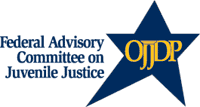
On January 12, 2017, OJJDP convened a webinar-facilitated meeting of the Federal Advisory Committee on Juvenile Justice (FACJJ).
Following updates from the chairpersons of FACJJ’s subcommittees on Legislation and Public Policy, Research and Publications, Transitioning Youth, and the Subcommittee on Lesbian, Gay, Bisexual, and Transgender Youth, then-OJJDP Administrator Robert L. Listenbee offered his final remarks to the FACJJ members. “Over the past 4 years, we have initiated many programs and projects that have supported state-level reforms that reduce reliance on incarceration and embrace developmentally appropriate and trauma-informed approaches,” said Mr. Listenbee. “These reforms offer troubled youth new hope for positive outcomes.”
Mr. Listenbee spoke about the Justice Department’s Changing Minds public awareness campaign and its potential to catalyze a shift in public understanding regarding children’s exposure to trauma. The goal of the campaign is to raise awareness about the prevalence of violence in children’s lives and about how violence and trauma can derail a child’s healthy growth and development. The campaign also aims to motivate adults who regularly interact with children and youth to take action and help.
As part of a larger effort to provide more responsive support to states as they work to reform their juvenile justice systems, OJJDP recently begun a focused effort to engage directly with state advisory groups (SAGs). In 2016, OJJDP staff visited with SAGs in California, Florida, Georgia, Iowa, New York, Pennsylvania, Utah, and Virginia. Mr. Listenbee assured FACJJ members that the partnership between OJJDP, the states, and the SAGs will continue to be an agency priority. “The meetings are an important forum for OJJDP to gain a clear sense of what’s going on in different parts of the country, what the pressing needs are, and how to clarify our objectives to directly address those needs,” he said. OJJDP staff will continue to take part in SAG meetings in 2017 and beyond.
Nicole Dennis, Deputy Associate Administrator of OJJDP’s Juvenile Justice System Improvement Division, updated attendees on the Office’s recent activities to ensure access to counsel, enhance reentry services for transitioning youth, and ensure that a young person’s record will not become an obstacle to future success.
According to Ms. Dennis, to date, OJJDP has transferred more than $3 million to the U.S. Department of Housing and Urban Development (HUD) under the Juvenile Reentry (Legal) Assistance Program (JRAP). With these funds, HUD is funding 21 JRAP partnerships, each consisting of a public housing authority and a local legal services provider. JRAP services are available to youth younger than age 24 who are current or former public housing residents, and who are reentering their communities following secure confinement or out-of-home placement. Services include expungement or sealing of juvenile records and obtaining certificates of rehabilitation. JRAP service providers also assist youth in—
- Enrolling in school or gaining access to special education services.
- Navigating questions on college applications pertaining to criminal justice history.
- Navigating employment applications and overcoming employment discrimination related to their juvenile justice involvement.
- Obtaining driver’s licenses or professional licenses that may be necessary to obtain employment.
- Overcoming housing discrimination and other barriers to housing.
Ms. Dennis informed attendees that under its Smart on Juvenile Justice: Enhancing Youth Access to Justice initiative, OJJDP is also strengthening juvenile defense by funding the development and implementation of policy and practice to manage well-resourced juvenile indigent defense systems, funding resource centers that will help these defense systems enhance the quality of legal representation, and supporting nonprofit organizations that provide direct civil legal services, mentoring, and reentry planning to youth.
Resources:
FACJJ's meetings are open to the public; anyone may register to attend and observe. Additional information about the committee is available on its website.
The Federal Advisory Committee on Juvenile Justice is a consultative body established by the Juvenile Justice and Delinquency Prevention Act of 1974, as amended (Section 223), and is supported by OJJDP. Composed of members of state advisory groups on juvenile justice, the committee advises the President and Congress on matters related to juvenile justice, evaluates the progress and accomplishments of juvenile justice activities and projects, and advises the OJJDP Administrator on the work of OJJDP.
